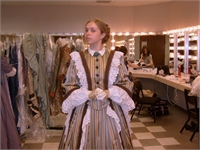
What is Acting?
Important Notice: Our web hosting provider recently started charging us for additional visits, which was unexpected. In response, we're seeking donations. Depending on the situation, we may explore different monetization options for our Community and Expert Contributors. It's crucial to provide more returns for their expertise and offer more Expert Validated Answers or AI Validated Answers. Learn more about our hosting issue here.
What Is Acting?
Most people personally experience acting for the first time in the public schools, either because they have to perform a skit in class, or through a school performance of some kind. If you’ve ever been to a school Christmas show, for example, you will notice that the kids usually stand, stiff as a board, and say lines. The really expressive ones are told to “act like” someone or something. But once they do their bit, however, the “deer in the headlights” stance quickly returns. In other words, they are told to pretend. That’s great, because one thing that little kids understand is pretend play. Yet, as these same kids get older the concept of pretending to be someone stays with them and they naturally call it “acting”.
The idea that acting is pretending existed in most theatres as well up until the late 1800s. Until that time there were books that gave actors instructions on hand gesturing to express emotion and particular movements that the audience would recognize as an indication that an actor was feeling something. Yet, when Constantin Stanislavski became involved with the Moscow Arts Theatre at the age of 14, he began to develop new ideas about what acting was that forever changed acting as a profession 1.
The theories that Stanislavski developed were not simply ideas that he thought up just to be doing something. He, like so many Russian actors of his time, went to the theatre everyday and every night he went home to work on his craft. What Stanislavski found was that even if he learned hand gesturing, or body movements, and even if he spoke dialogue in a certain way, there was something significantly missing about his performance. That something was believability.
Sonia Moore, a famous acting instructor and author of The Stanislavski System, stated, “An actor’s mind, will and emotions – the three forces responsible for our psychological life – must participate in the creation of a live human being on stage” 2. In other words, an actor must have real feelings and be “in the moment”, physically, mentally and emotionally in order to be believable. It is what Eric Morris, author of No Acting Please, referred to as “being” 3.
Other famous teachers of acting, such as Bertold Brecht, (German playwright, teacher and director) insisted that acting should primarily concentrate on the physical aspects of characterization and not “put both [the actors] and the audience into a hypnotic trance” 4. This was in contrast to what Viola Spolin suggested: that actors should be at “play” in their performances 4.
Needless to say, the theories about what acting is and how it should be used are endless and very often conflict with one another.
So what is acting?
I refer to Jack Nicholson’s foreword in Eric Morris’ book for the answer. Nicholson stated, “If you’re interested in this sort of thing, it can be an inspiring process…There are no guarantees. The Method is: If it works, use it” 3.
And what this means is that every actor is unique in that he or she has his or her own past, life experiences, emotions, beliefs, thoughts and physical methods of expression. Consequently, the acting theory that rings a bell in one actor’s head, may be totally lost on another, and/or the methods used to really act, or be in the moment, may be a culmination of processes, rather than one specific, all or nothing, approach to the craft.
Nevertheless, the one thing that all of these theories have in common is simply the actor. And therein lies the answer. Sir John Gielgud wrote, “[Acting is] experimenting and discovering one’s own way of expressing one’s self” 2. It is a constant process of learning about every aspect of being and then applying what has been learned to a role. But it doesn’t stop there. Acting develops through the interaction with others during the role, as well in as in real life, when the actor analyzes events or conversations that have taken place. Acting progresses when the actor watches a horror movie and then says, “I would have…”, and then thoroughly considers the circumstances and emotions involved. In a nutshell, it is the ability to strip away what is fake and find the core of what is real inside of each individual – and then have the courage to share that reality with others.
Jack Nicholson said, “It’s not for everyone. It’s not ‘entertaining’ – though it can be” 3.